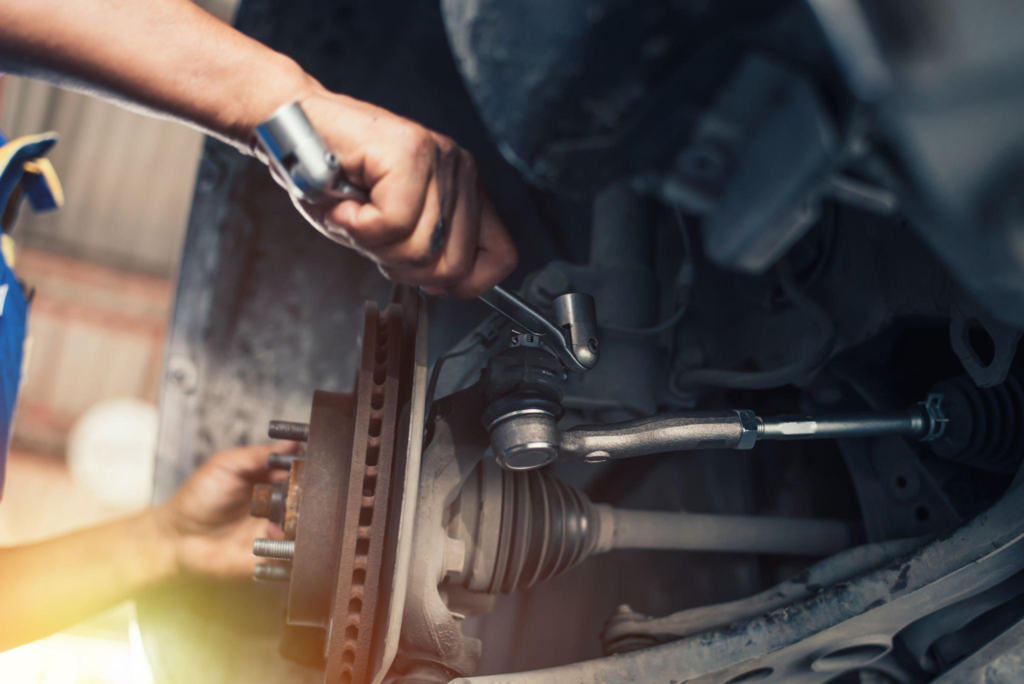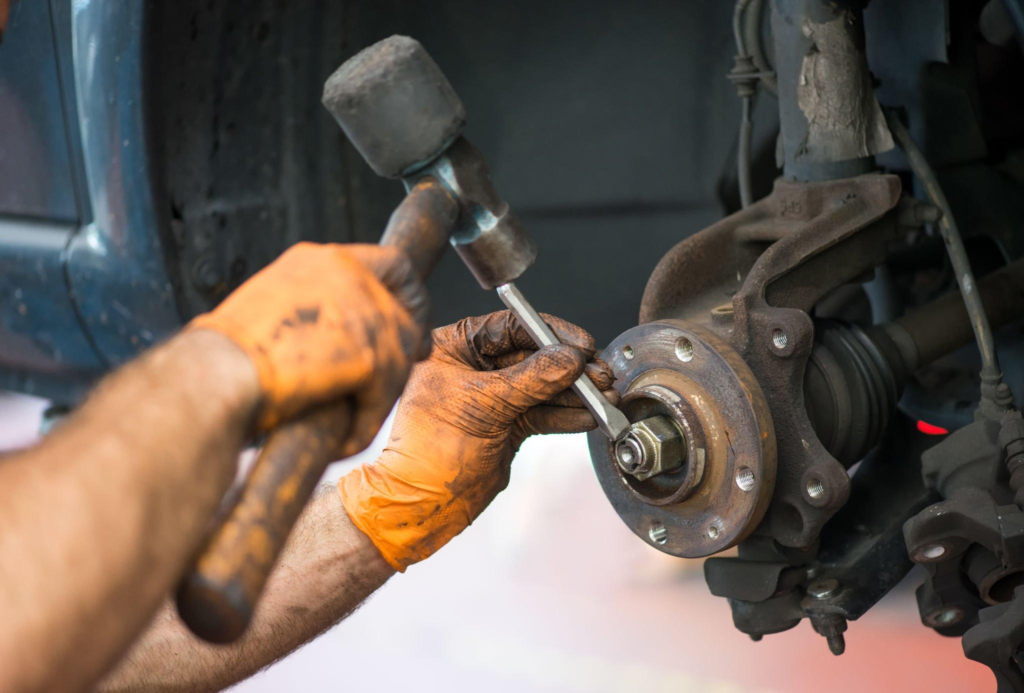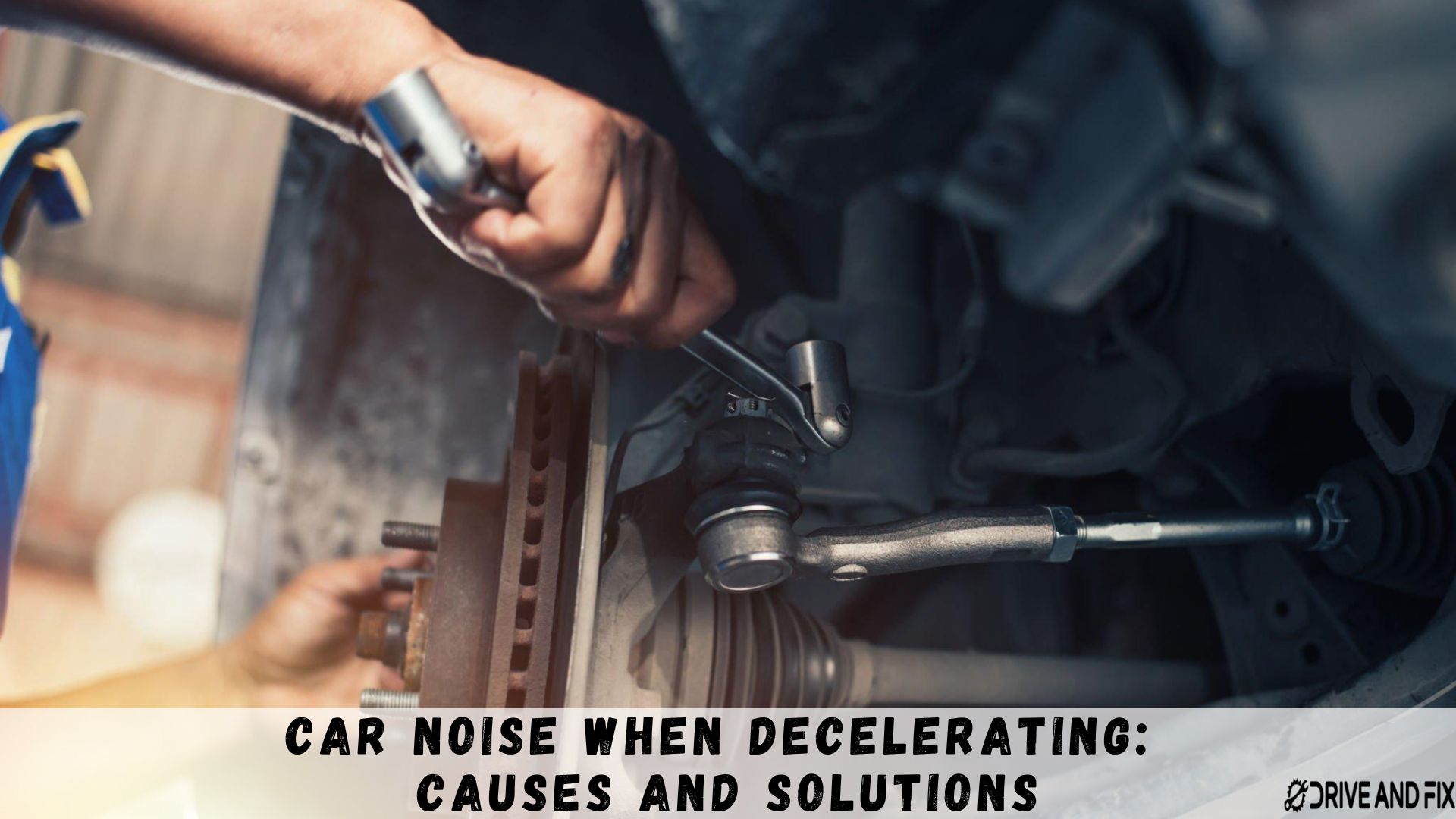Have you ever noticed a whining or squealing noise coming from your car when you slow down? If so, you are not alone. Many drivers experience this annoying sound at some point, and it can indicate a problem with your vehicle. Read further to learn the possible causes of car noise when decelerating and how to fix them.
Causes of Car Noise When Decelerating and How to Solve Them

Faulty Water Pump
The water pump is part of the engine cooling system and is responsible for circulating coolant throughout the engine. The coolant is helpful in temperature regulation of the engine and prevents overheating.
If the water pump is damaged or worn out, it can make a whining or squealing noise when the car slows down. The pump struggles to maintain the proper pressure and coolant flow. A hot or burning smell, a coolant leak under the car, or an overheating engine may also accompany the noise.
The solution for a bad water pump is to replace it with a new one. This task is not very difficult but can be time-consuming and require some tools and skills. You can fix it yourself or visit a mechanic to employ professional service.
Failing or clogged Fuel Pump
A fuel pump carries fuel from the tank to the engine. The fuel pump regulates the fuel pressure and flow to ensure optimal performance and efficiency.
If the fuel pump fails or clogs, it can cause low fuel pressure and a whining noise when the car slows down. The pump is trying to compensate for inadequate pressure by working harder. The noise may also be accompanied by poor acceleration, rough idling, stalling, or difficulty starting.
To sort out a bad fuel pump, replace it with a new one. This task is difficult, as it involves accessing the fuel tank and disconnecting the fuel lines. You may require special tools and equipment to do this safely and correctly. It is advisable to see a mechanic for professional service.
Pinion Bearing
The pinion bearing is part of the differential, allowing the wheels to spin at different speeds when turning. The differential consists of a ring gear, a pinion gear, and several bearings that support them.
When the pinion bearing is damaged or worn out, it can make a whining or howling noise when the car slows down. This is because the bearing cannot support the pinion gear properly and causes friction and vibration. The noise may also be accompanied by a clunking or grinding sound when shifting gears or turning.
To solve a bad pinion bearing problem, replace it. This task is not very simple since it involves removing the differential cover, draining the fluid, removing the pinion nut and flange, and installing the new bearing. You may need special tools and skills to do this accurately and safely. It is recommended to take your car to a mechanic for professional service.
Reasons For U-Joint Noise When Decelerating
- Ujoint noise when decelerating means that your universal joints (u-joints) are worn out or damaged. U-joints are X-shaped components that connect the driveshaft to the transmission and the differential. They permit the driveshaft to move up and down at an angle as the car travels over bumps or turns.
- When the u-joints lose their lubrication or wear out, they can make a high-pitched squeaking, humming, or howling noise when the car slows down. The noise may differ in pitch depending on your driving speed. You may also hear a clunking or grinding noise when shifting gears or changing directions.
Ujoint noise when decelerating is not normal and indicates a serious vehicle problem. If left untreated, bad u-joints can cause damage to other parts of your car, reduce your fuel efficiency, and compromise your safety. It would help if you replaced your u-joints as soon as possible or got professional service.
How to Know if My U-joints Are Bad
Some signs of bad U-joints are:
• A squeaking, humming, or howling noise when decelerating
• A clunking or grinding noise when shifting gears or changing directions
• A vibration or shudder in the drivetrain
• A loose or wobbly driveshaft
• A leak of grease from the U-joints
Tips and Tricks to Prevent Car Noise When Decelerating

- Maintain your vehicle regularly and follow the manufacturer’s recommendations for fluid changes and inspections. This can help you detect and fix any problems with your water pump, fuel pump, pinion bearing, or other components before they cause noise or damage.
- Use high-quality fluids and parts that are compatible with your vehicle’s specifications. This is to ensure your vehicle’s performance, efficiency, and longevity. Avoid using cheap or counterfeit products that may cause harm to your vehicle or void your warranty.
- Avoid driving over rough roads or harsh conditions that cause stress and wear on your vehicle’s components. This can help lower the risk of damage to your water pump, fuel pump, pinion bearing, or other parts that may cause noise when decelerating.
- Drive smoothly and avoid sudden or frequent acceleration or deceleration that can cause strain on your vehicle’s drivetrain. This prevents excessive friction and vibration in your water pump, fuel pump, pinion bearing, or other parts that may cause noise when decelerating.
FAQS

How do I diagnose car noise when decelerating?
Listen to the type, pitch, and location of the noise
Look for other symptoms, such as a hot or burning smell, a coolant leak, poor acceleration, rough idling, stalling, difficulty starting, a clunking or grinding sound, vibration or shudder, a loose or wobbly driveshaft, or a grease leak.
Use a stethoscope or a mechanic’s ear to pinpoint the source of the noise
Inspect the water pump, the fuel pump, and the pinion bearing for any damage or wear
How do I fix car noise when decelerating?
Replace the water pump if faulty or worn out
Buy a new fuel pump if it fails or clogged
Replace the pinion bearing if damaged or worn out
Seek professional service if you are unsure or unable to perform the repairs yourself
How do I prevent or reduce car noise when decelerating?
Maintain your vehicle regularly and follow the manufacturer’s recommendations for fluid changes and inspections.
Use high-quality fluids and parts that are compatible with your vehicle’s specifications.
Avoid driving over rough roads or harsh conditions that cause stress and wear on your vehicle’s components.
Drive smoothly and avoid sudden or frequent acceleration or deceleration that can cause strain on your vehicle’s drivetrain.
Can I drive with bad U-joints?
Driving with bad U-joints is not recommended since it can further damage your vehicle and put your safety at risk. Bad u-joints can cause the driveshaft to break or detach from the vehicle, resulting in a loss of power or control. It would be best to replace your u-joints immediately or take your car to a mechanic for professional service.
Final Thoughts
Car noise, when decelerating, is not only annoying but also potentially dangerous. If you hear any unusual sound from your car when you slow down, you should not ignore or delay fixing it. You should either replace the faulty component yourself or seek professional service. You can also prevent or reduce noise by maintaining your vehicle properly and driving smoothly. Doing so can ensure your vehicle’s performance, efficiency, and safety.


